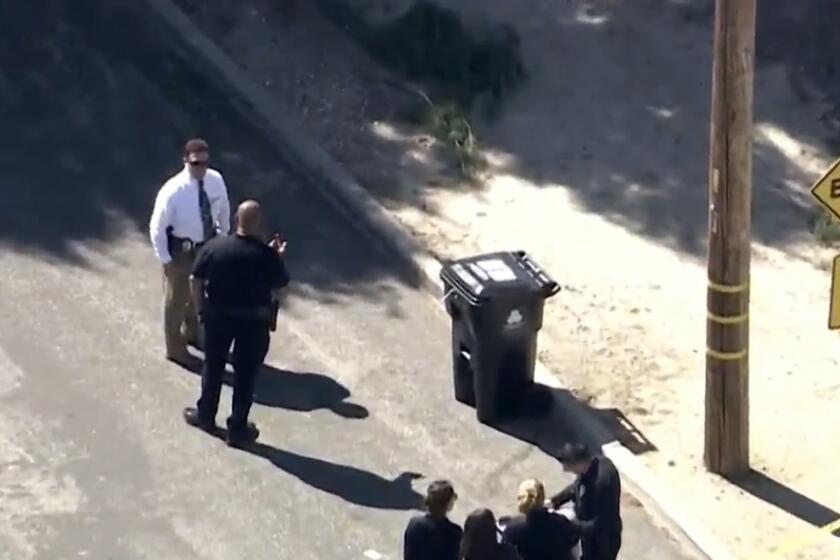‘This is like paradise’: Seal Beach’s pay-to-stay jail actively markets its jail, attracting deep-pocketed offenders
Sitting at a picnic table under azure skies last fall, a 37-year-old onetime CEO of a financial services company contemplated his good fortune.
Sure, he was surrounded by a barbed wire fence, and lunch was frozen hot dogs and string beans being thawed in a bare-bones kitchen. But the alternative was Orange County jail, where he would be warehoused in barracks with hundreds of others, where alliances ran along racial lines and fights broke out daily.
Jack, who asked to be identified by his nickname because his young children thought he’s in New York on an extended business trip, was paying $100 a night for the privilege of serving his 90-day sentence for driving under the influence of heroin in Seal Beach’s pay-to-stay jail.
“This is like paradise,” the Orange County man said.
He got a taste of the more typical jail experience when he served his first 17 days in Orange County’s Theo Lacy Jail. He said his defense attorney was able to get the case transferred to a different judge and get him pay-to-stay jail for the remainder of his sentence.
He handed over a $7,300 cashier’s check without hesitation. Here in Seal Beach, he was sharing his quarters with three 20-somethings. There was a large selection of DVDs and books, the hot water never ran out, and he was treated like a human being, he said.
In the marketplace of jail beds for rent in Southern California, Seal Beach has gained a reputation as the go-to jail for many deep-pocketed offenders.
Seal Beach’s pay-to-stay program generates more revenue than any other city in L.A. and Orange counties, a review of records shows. In the fiscal year ending last June, Seal Beach took in $365,000 from paying inmates, making up close to half of the jail’s total budget of $766,662. The city received 24% more pay-to-stay revenue than Anaheim, the second-most lucrative facility in the Times-Marshall Project review.
One reason the program is so lucrative for the small city is that it accepts more inmates charged with serious crimes — who tend to have longer sentences — than other cities.
From 2011 through 2015, people convicted of crimes involving violence, threats of violence or sex-related offenses made up more than 16% of the Seal Beach jail’s 326 paying customers. That was a higher proportion than any other city with a significantly-sized program. It housed twice as many inmates convicted of assault, sex crimes, battery, domestic violence or robbery compared with Anaheim, which is more than 10 times its size.
A spokesman for Anaheim said the city recently shut down its pay-to-stay program “based on restructuring and efficiency of operations.”
Seal Beach, meanwhile, has actively marketed its jail.
As recently as 2013, the city took out an ad in L.A. Weekly advertising its flat screen TVs, a computer and media room, and cleanliness — “Why spend your jail sentence of 365 days or less at county?”
Sgt. Steve Bowles of the Seal Beach Police Department said he regularly meets with judges and prosecutors and attends defense attorney luncheons to get the word out about his jail, and has taken out ads on bar association websites. The jail was also featured in a “Today” show segment on NBC.
Seal Beach was the jail of choice for Los Angeles Kings defenseman Slava Voynov when he was sentenced to 90 days in 2015 for an incident of domestic violence that left his wife covered in blood and with a gash above her eye that required eight stitches.
Bowles, who runs Seal Beach’s paying program, said it’s not the city’s role to decide who is allowed the pay-to-stay option.
“We look at it as, it’s already been agreed to and vetted by the D.A., the judge and the defense attorney,” he said. “We’re here to fulfill our role in the criminal justice system.”
Jack said he was thankful for the pay-to-stay option. Between his stint in county jail and in Seal Beach, he said he’d learned enough of a lesson for this time, his third DUI, to be his last. Some day, he will probably tell his children about the experience as a cautionary tale, he said.
“I’m really happy I was able to come here,” he said. “But you need the money to do it.”
For more California news, follow me on Twitter @vicjkim
More to Read
Start your day right
Sign up for Essential California for news, features and recommendations from the L.A. Times and beyond in your inbox six days a week.
You may occasionally receive promotional content from the Los Angeles Times.







